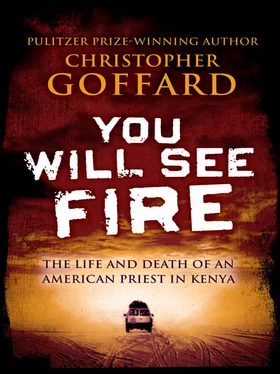After two years in St. Louis, Kaiser accompanied Barnicle to the four-year course at St. Joseph’s College in London, where they were among the few Americans. They received a red sash to drape over their cassocks, a sign they were willing to shed blood for the faith. Missionary work had its hazards, though it was less risky than it had been in the years before quinine, when an assignment to a place like Kenya, where Mill Hill had been sending men since 1904, often meant quick malarial death. The seminary was dominated by archaic rules, in the fashion of a Benedictine order. After night prayers, students were expected to observe the magnum silencium the instant they placed a foot on the first step leading to the dormitory area, and it reigned till morning Mass. The rooms were tiny, primitive, with a small bed, a cupboard, a desk, a lamp, a chair, a cross on the wall. To discourage “unhealthy friendships,” a euphemism for homosexual trysts, there was a strict prohibition against visiting one another’s rooms.
Harrie van Onna, a Dutch seminarian, would remember Kaiser as a quiet man of great warmth who possessed a naive idealism about the faith but sometimes clashed with the men who ran its institutions. The missionary order left little room for individual dissent on matters of doctrine—Kaiser expressed skepticism about the logic of celibacy but agreed to adhere to the vow—and the seminary structure was an infantilizing one. Like Kaiser, van Onna had commanded men in the military; now they were required to ask permission to take a trip into downtown London.
Having studied Spanish, Kaiser had anticipated a posting to South America after his ordination. But Mill Hill needed priests in Africa. He had no special knowledge of the continent and spoke none of its indigenous languages; he was not able to conceal a sense of disappointment at the assignment. Still, he was a man of obedience, and adaptable to any terrain. That had been the pride of the Eighty-second Airborne, after all: the ability to go anywhere in the world with little notice, mountain or desert, city or bush.
He would, at least, be spared the mundane duties and circumscribed routines of a big-city priest, for which he understood himself to be temperamentally unsuited. Plus, he relayed with delight to his brother Francis, he would be able to take his hunting rifle to Africa.
A YEAR AFTER his arrival in Kenya, he steered his motorcycle southward out of tightly packed Kisii country into what some people called “the other side”—the immense open plains of Masailand in the Transmara region. He stood on a hill Конец ознакомительного фрагмента. Текст предоставлен ООО «ЛитРес». Прочитайте эту книгу целиком, купив полную легальную версию на ЛитРес. Безопасно оплатить книгу можно банковской картой Visa, MasterCard, Maestro, со счета мобильного телефона, с платежного терминала, в салоне МТС или Связной, через PayPal, WebMoney, Яндекс.Деньги, QIWI Кошелек, бонусными картами или другим удобным Вам способом.
overlooking the Migori River and beheld a vista alive with elephants, buffalo, topi, waterbuck, and impalas. He felt, he wrote, as if he had been admitted to the Garden of Eden, a hunter’s paradise. Kaiser applied for a hunting license and, on free days, when other missionaries headed to the cities, he disappeared into the tall grass, at times in the company of traditional spear-bearing Kisii hunters. Traveling the region with his gun, he learned every square mile of it. He did not pursue trophies—seeking only the game meat he used to feed himself and his parishioners—but he was thrilled by the hunt. He elbow-crawled with his shotgun to within twenty yards of a warthog, which he considered the best meat in Kenya.
This was Kenyatta’s country, still in the childhood of its independence, and Kaiser would write of its “easy peaceful aspect.”
During his fourth year in Kenya, he boarded a night bus out of Kisii with a few belongings, heading to the Nairobi airport in October 1968. For reasons that are unclear, Mill Hill had reassigned him to the States. He would be the rector of the missionary order’s house in Albany, New York, the headquarters of its American operation. It’s not certain whether Kaiser sought this assignment, but his writing suggests that he believed it only a temporary departure from East Africa.
The bus was traveling along a high, cold road, he recalled in a memoir years later, when it approached an intersection crammed with trucks. All along the roadside, under a chilly rain, crowded hundreds of Kisii peasant farmers with the sum of their possessions—chickens, goats, bedding, pots, pans. Some were huddled near piles of blazing firewood they had foraged. He climbed off the bus and began asking questions. The farmers, he learned, had pooled their savings and purchased a large estate—they displayed documents to prove it—only to discover, after making the journey to their new home, that someone else had bought the land and was occupying it. A fraudulent company had swindled them out of everything.
By Kaiser’s account, the spectacle profoundly affected him Конец ознакомительного фрагмента. Текст предоставлен ООО «ЛитРес». Прочитайте эту книгу целиком, купив полную легальную версию на ЛитРес. Безопасно оплатить книгу можно банковской картой Visa, MasterCard, Maestro, со счета мобильного телефона, с платежного терминала, в салоне МТС или Связной, через PayPal, WebMoney, Яндекс.Деньги, QIWI Кошелек, бонусными картами или другим удобным Вам способом.
. He decided that when he returned, he would have to immerse himself in the villagers’ lives and familiarize himself with the nation’s laws. He was so troubled by the farmers’ plight that he stopped by the American embassy in Nairobi to find out whether he could become a Kenyan citizen. He thought it might somehow put him in a better position to help. But renouncing his United States citizenship would leave him at the mercy of the Kenyan authorities, who might deny him a visa if he wanted to visit the States, where his two brothers and sister and aging parents remained; he might find himself trapped in Africa if he needed to leave in a hurry. However much he thought himself a Kisii, American citizenship—and the measure of protection that implied—amounted to what he called a “great asset.”
His stay in the States would last a year. He returned to Kenya Конец ознакомительного фрагмента. Текст предоставлен ООО «ЛитРес». Прочитайте эту книгу целиком, купив полную легальную версию на ЛитРес. Безопасно оплатить книгу можно банковской картой Visa, MasterCard, Maestro, со счета мобильного телефона, с платежного терминала, в салоне МТС или Связной, через PayPal, WebMoney, Яндекс.Деньги, QIWI Кошелек, бонусными картами или другим удобным Вам способом.
in November 1969, bearing what he called “my luggage & idealism & my lousy novels.” Entering the Mill Hill house in Nairobi to find other priests and a local bishop drinking tea, he braced himself for their reaction. Word had circulated among Africa’s Mill Hill priests that something dreadful had happened during his time in New York. That he’d made accusations against the eccentric head of the society there. That he’d shown a streak of volatility some had already glimpsed in him. That he’d resisted police and been briefly institutionalized. “I had predetermined to be calm and serene & so I was extremely nervous, but everyone rushed to my aid and paid me much complimentary attention or else fled the room in cowardice,” he wrote in a letter to Barnicle. “They don’t so much think I am nuts as simply had a severe nervous breakdown—and no doubt they might be right.” Kaiser acknowledged that “there is the possibility that I am subjectively dishonest—nuts,” and he mocked his own imprudence during the New York episode: “Prudence, Tony, that’s the governing virtue.” Enthusiastic about returning to Kisiiland, he ended the letter on a note of optimism, but he hinted at the psychic toll the last year had taken: “The future looks good for me Tony—I have no place to go but up.”
Читать дальше












